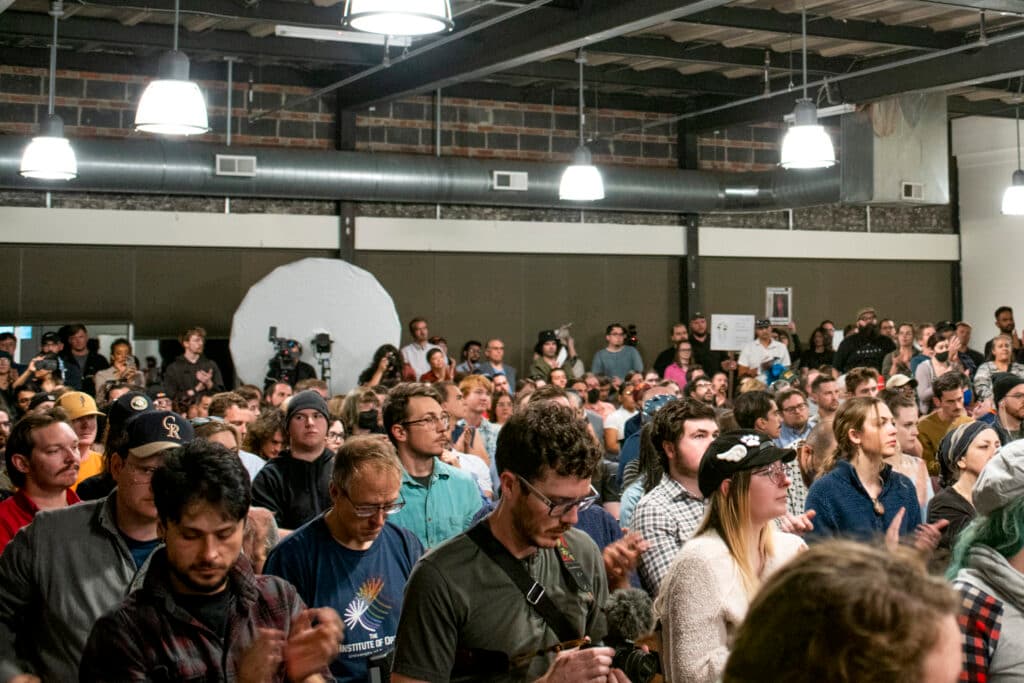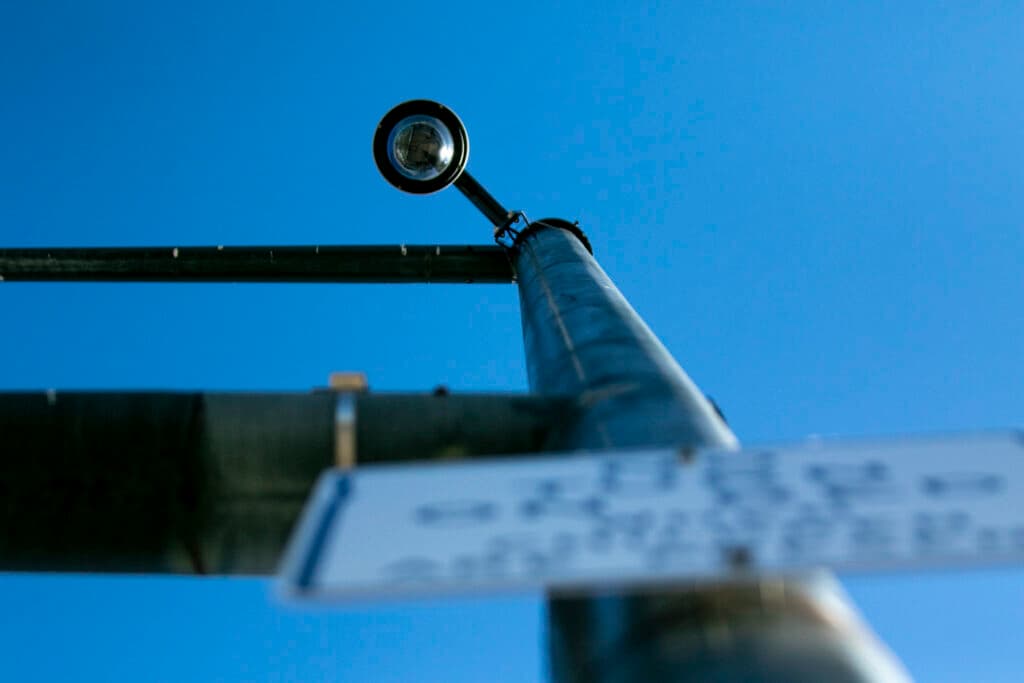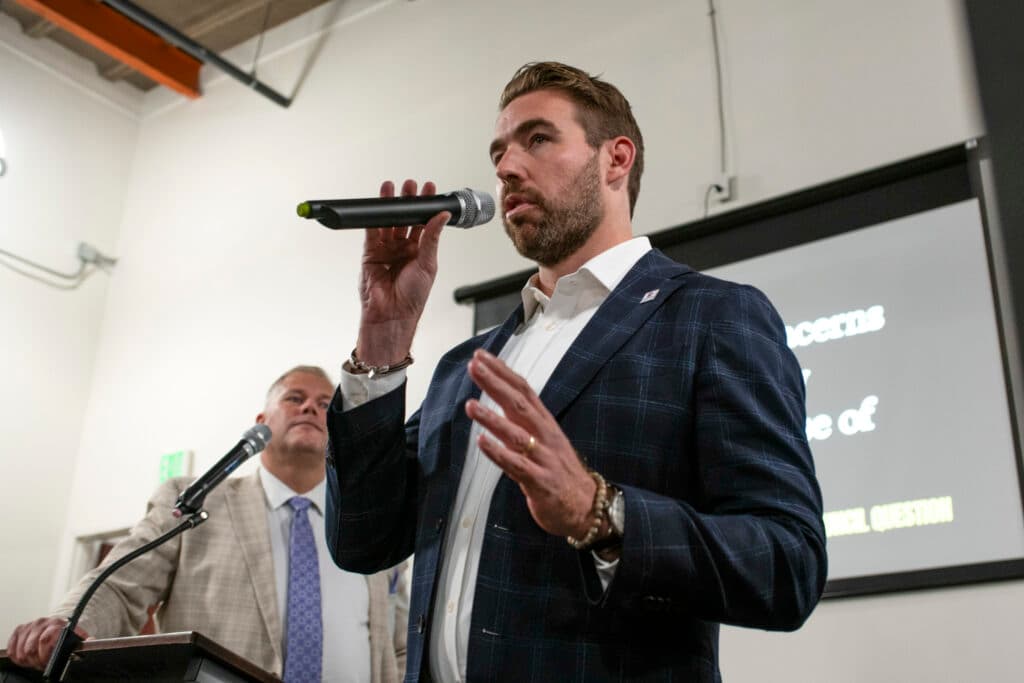Updated at 5 p.m. on Oct. 23, 2025
Hundreds of people crammed into a town-hall meeting on Wednesday to demand that Mayor Mike Johnston shut down Denver’s licence-plate tracking surveillance system and stop working with the technology company Flock Safety.
Among them was an influential YouTuber who flew in from Austin — a sign of how fights over surveillance technology across the U.S. have gone viral.
“I'm a privacy person. So the idea that you're going to be watched everywhere that you go and there's nothing that you can do about it is highly offensive to me,” said Louis Rossmann, a consumer rights activist and YouTube streamer. “But mostly I wanted people to realize that they can make changes in their local government … if they put their mind to it and if they actually show up.”
Rossmann livestreamed the protest to 24,000 viewers, and the in-person crowd included plenty of his followers — known as “Clippies,” after the iconic and notorious Microsoft character. Two overflow rooms also were packed wall-to-wall.
“I came out here actually because Louis Rossmann was talking about it on his channel, and I realized that it was going to be in my city and I didn't know before all the things that Mayor Johnston had done,” Erica Kasson said. ”And it made me very, very angry to know that someone I voted for is all right with surveilling the citizens or residents of the city. It's an egregious violation of our rights and civil liberties. I cannot, with words, describe how [expletive] angry I am.”

Safety vs. surveillance
At the center of the controversy is the city’s use of Flock Safety, a company that produces license-plate reading cameras and software. Police agencies and cities across the country have embraced the technology, which can scan millions of license plates, helping investigators quickly track and locate vehicles in criminal investigations.
But the cameras have drawn fierce criticism about potential privacy violations, especially because federal immigration authorities have had access to the national Flock network.
“It already raises serious alarm bells about potential Fourth Amendment violations and our protections against unreasonable search and seizures,” said Julian Camera, the lead organizer for the American Civil Liberties Union in Colorado. “But then when you add all this lack of transparency and false information being shared by city officials and Flock itself, we have a real problem on our hands.”
The city of Denver installed 111 solar-powered cameras across the city in May 2024. But some Denver City Council members balked at the idea of extending the contract a year later. Facing opposition, the Johnston administration instead bypassed the council, extending the contract by keeping its cost below a certain threshold.
“We were not a part of that conversation,” Councilmember Serena Gonzales-Gutierrez said at the town hall. She is a part of the Johnston-appointed surveillance task force.
“I did ask the mayor directly about that. I said, ‘I'm concerned that we've had this task force that has been meeting now for a couple of months and this has now just popped up and here is the solution without any consultation,” Gonzales-Gutierrez said. “And I was reminded that that is executive authority.”

City officials say they’re putting in new safeguards and that they will bring the question to a full city council vote next year. In a press release, Johnston said the privacy questions have been solved in this new contract extension.
“I’ve made clear to Flock’s leadership that I expect total transparency and that anything less will result in an end to our relationship,” Johnston said in a press release. “To their credit, they have agreed to our terms and will build a Denver-specific package that will lead the way in using this technology for the public good.”
Some see the technology as an existential threat.
“I'm really curious about separation of this technology from the federal government,” said Annie Ray Briggs of East Colfax.
“With current conversations right now in the United States, it's not unlikely that within the next year I'm going to be labeled a terrorist for being transgender, for being anti-Israel, for being a protester,” Briggs continued. “All these things are things that could very much put me on a watch list. What's protecting me as a citizen of Colorado from having this information be sold about me?”
Johnston wasn’t at the town hall protest, but Tim Hoffman, his policy director, fielded questions. He said that the city’s new agreement doesn’t allow jurisdictions outside of Denver to access the data, unless there is a memorandum signed between Denver and an outside city or law enforcement.
“Isn’t that what Flock said before?” someone shouted from the crowd.
During the original contract run, city officials said Denver’s data was not accessible to other agencies through a national database. But in April police officials said that, unbeknownst to them, Denver’s data was exposed to a “national search” function.
The city says there is no evidence that Denver’s Flock data has been used for immigration enforcement. But thousands of agencies around the nation had access to Denver data through the “national search” function — which DPD officials said they didn’t know until April, when they deactivated the function.
Another crowd member asked Hoffman how this was going to affect Johnston's chance of reelection.

“I just was kind of thinking about my role coming here tonight. I would describe myself as a normie Democrat, like someone who votes ‘blue no matter who,’ someone who would probably vote for Mike Johnston nine times out of 10, until this stuff comes up,” said one attendee who gave the name August.
But August warned that “what makes us most upset with our political leaders is when we feel disrespected by them.”
Hoffman said that while they disagree on this issue, Johnston has built support with other policies, like his handling of the immigration crisis.
“There is no one in the mayor's administration, the mayor especially, who wants ICE rounding up our most vulnerable citizens or residents. There is no one in the mayor's administration, the mayor especially, who wants a woman who comes here from Texas for reproductive health care to then have that action be prosecuted back in the state of Texas,” Hoffman said. “So that is why we have instituted all of these new safety measures, to make sure that those things don't happen.”
Editor's note: This story was updated to correct the attribution of Councilmember Serena Gonzales-Gutierrez's quote, which had previously been incorrectly attributed to Councilmember Sarah Parady.













